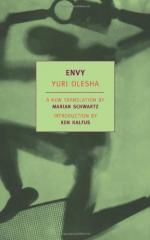|
This section contains 7,678 words (approx. 26 pages at 300 words per page) |

|
SOURCE: Borden, Richard C. “Iurii Olesha: The Child Behind the Metaphor.” Modern Language Review 93, no. 2 (April 1998): 441-54.
In the following essay, Borden explores the importance of the childhood experience to the formation of metaphor in Olesha's narratives.
Iurii Olesha (1899-1960), like many of his generation, believed that the poet's singular gift was an ability to see the world ‘as if for the first time’, ‘as would a child’, as, in fact, he himself had seen the world in childhood.1 Poets were they who preserved the child's capacity for unmediated perception. Olesha also believed, however, that childhood experience was itself the source of art, that ‘artistic intellect […] comes after all from childhood, when a man really does see the world for the first time’.2 Poets, moreover, do not merely see like children, they restore to others childhood's actual images, sensations, and those modes of perception normally lost to adults...
|
This section contains 7,678 words (approx. 26 pages at 300 words per page) |

|


